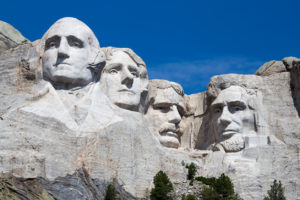
So, in honor of the 4 year anniversary of that ruling, we travel to the Upper Plains state of South Dakota. South Dakota is the 5th least populous state in the U.S. and is also the 5th least densely populated state in the country. The state is bisected by the Missouri River, dividing the state into two geographically and socially distinct halves, known to residents as “East River” and “West River.”
When you’ve been writing “State of the Month” blogs for several years, you end up hitting all of the states eventually, but South Dakota has certainly received its share of “publicity” from us over the last four years, as we’ve been referring to the US Supreme Court case of South Dakota v. Wayfair almost daily since that decision was handed down in June 2018. Seems fitting that, as state tax professionals, we have some affinity for the state that gave us economic nexus and created much confusion and consternation for companies all over the country!
The Dissected Till Plains, an area of rolling hills and fertile soil that covers much of Iowa and Nebraska, extends into the Southeastern corner of the state. Layers deposited during the Pleistocene epoch, starting around two million years ago, cover most of eastern South Dakota. These are the youngest rock and sediment layers in the state, the product of several successive periods of glaciation which deposited a large amount of rocks and soil, known as till, over the area.
The Black Hills region is home to 2 historical monuments carved right into towering granite peaks: Mount Rushmore, the iconic depiction of four revered U.S. presidents, and Crazy Horse Memorial, a tribute to the storied Native American tribal leader. The state welcomes millions of tourists annually, who flock to these sites.
Business Climate
The service industry is the largest economic contributor in South Dakota. This sector includes the retail, finance, and health care industries. Citibank, which was the largest holding company in the United States at one time, established national banking operations in South Dakota in 1981 in order to take advantage of favorable banking regulations. Ellsworth Air Force Base is the second largest single employer in the state.
Agriculture has historically been a key component of the South Dakota economy. Although other industries have expanded in recent decades, agricultural production is still very important to the state’s economy, especially in rural areas. The five most valuable agricultural products include cattle, corn, soybeans, wheat and hogs. Agriculture related-industries as such meat packing and ethanol production also have a considerable economic impact on the state. South Dakota is the sixth leading ethanol-producing state in the nation.
Another important sector in South Dakota’s economy is tourism, as mentioned above. Many travel to view the attractions of the state, particularly those in the Black Hills region, such as historic Deadwood, Mount Rushmore, and nearby state and national parks.
Tax Climate
South Dakota imposes neither an individual nor corporate income tax.
Since the state does not have an income tax, there is no apportionment formula. Therefore, the state also does not have a method for sourcing income.
Sales Tax Structure
The state sales tax rate is 4.5% and the highest combined rate is 6.4%.
Generally, sales of digital products in South Dakota are taxable. South Dakota imposes sales and use tax on sales of prewritten computer software delivered electronically. The state also imposes sales and use tax on the sales of custom computer software delivered electronically. South Dakota imposes sales and use tax on sales of software as a service. How products are produced, sold and delivered is critical to determining the tax status.
South Dakota has an economic nexus law where if an out of state seller sells $100,000 and 200 transactions into the state, sellers need to collect and remit sales tax on those transactions. This threshold applies to all transactions in the previous or current calendar year. Transactions that are included in this threshold include gross revenue from sales of tangible personal property, electronically transferred products, services delivered into the state, exempt sales and exempt services. This legislation went into effect on November 1, 2018.
A marketplace provider must collect and remit sales tax on all sales it facilitates into South Dakota if, in the current or preceding calendar year, the marketplace provider: is a remote seller with 200 or more transactions in South Dakota or $100,000 or more in gross sales in South Dakota; facilitates sales for at least one marketplace seller that exceeds that $100,000 sales /200 transactions threshold; or facilitates the sales of two or more marketplace sellers that, when their sales are combined, exceeds the $100,000 sales/200 transactions threshold. This legislation was enforced on March 1, 2019.
Many states have annual sales tax holidays, during which certain items the state wants to promote the purchase of (like school supplies emergency preparedness supplies, or energy efficient appliances) can be purchased sales tax free. South Dakota, however, does not currently have any sales tax holidays.
Our team at Miles Consulting Group is always available to discuss the specifics of your situation, whether in South Dakota or other U.S. States, and help you navigate the complex tax structures arising from multistate operations. Call us to help you achieve the best tax efficiencies.
Random Facts
- It is the 17th largest state in the Union.
- Eastern South Dakota has many natural lakes, mostly created by periods of glaciation.
- In North America, the continental pole of inaccessibility is in Southwest South Dakota, about 7 miles north of the town of Allen.
- The Mammoth Site near Hot Springs is a privately owned attraction in the Black Hills. A working paleontological dig, the site has one of the world’s largest concentrations of mammoth remains.
- Billy Mills, from the town of Pine Ridge, competed at the 1964 Summer Olympic Games in Tokyo, becoming the only American to ever win a gold medal in the 10,000-meter event for running.














